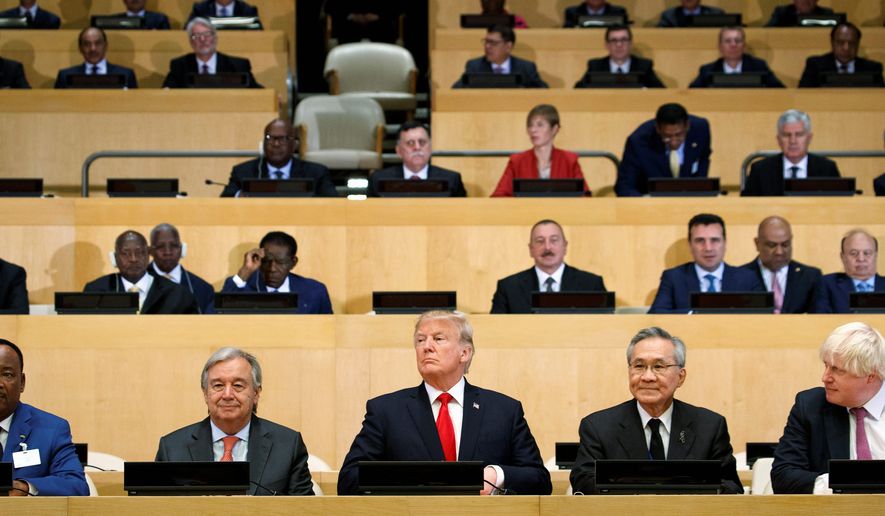President Trump will turn up the heat on North Korea and call out countries that coddle the rogue regime Tuesday in his first address to the United Nations General Assembly, said a senior White House official who recognized that the threat of war loomed over the speech.
The United Nations has exhausted nearly all diplomatic and economic sanctions it can impose and the military option terrifies the world, but foreign policy analysts said Mr. Trump has a golden opportunity to present a united front — most importantly with China and Russia — for whatever comes next.
That would send a powerful message to Pyongyang, which has accelerated its nuclear and missile programs in an effort to intimidate its neighbors and the U.S.
“He will speak in extremely tough terms about the North Korean menace, and the threat it poses to our security and the security of all the nations in that room,” said the official, who described the speech to reporters on the condition of anonymity. “He will talk about as well the enablement of the North Korean regime and what that means, too.”
Those remarks will be aimed directly at China and Russia, the biggest sponsors and protectors of Kim Jong-un’s hermit kingdom, although those two nations won’t have representatives at the gathering in New York.
Michael C. Desch, director of the International Security Center at the University of Notre Dame, said Mr. Trump will succeed in his first U.N. speech if it looks like the world is with him.
“He can look statesmanlike by rallying the international community around this issue rhetorically with no real expectation of having to achieve anything,” he said. “Bashing [North Korea] is what economists call a ’solidarity good.’ The purpose is to unite the group, not achieve anything beyond it.”
A week ago, the 15-member U.N. Security Council, which includes China and Russia, unanimously adopted its ninth sanctions resolution since 2006 over North Korea’s nuclear and ballistic missile programs.
North Korea has not been deterred. The North made its 15th missile test last week, lobbing one over northern Japan for a second time. A nuclear weapon detonated early this month, which Pyongyang claimed was a hydrogen bomb, was its most powerful to date.
As Mr. Trump prepared his speech, which he spent hours crafting to present his vision of America to the world, the U.S. military was conducting exercises flying advanced bombers and stealth jets over the Korean Peninsula.
The joint exercises with South Korea presented a demonstration of U.S. military power just days after North Korea’s latest missile test.
In the speech, Mr. Trump also is expected to address Iran, a sponsor of terrorism and a destabilizing actor throughout the Middle East. The Trump administration is mulling whether to certify Tehran’s compliance with an Obama-era deal to slow the Iranian nuclear weapons program.
Mr. Trump has said Iran is not living up to the spirit of the agreement.
The speech will attempt to rally other countries to do their part. Rather than minimizing the role of the United Nations, the official said, Mr. Trump will present “an optimistic vision for international cooperation based on respecting individual sovereignty.”
“It is a shared menace,” the official said. “Nations cannot be bystanders to history. If we don’t confront these threats now, they will only gather force and become more formidable.”
A united front could lay the groundwork for a diplomatic path to a peaceful resolution of the North Korea crisis, said Mona Khalil of Independent Diplomat, an international relations consulting firm.
“Even when fully and meaningfully implemented, sanctions alone do not work. They never have. Such sticks must be coupled with one or more of the following carrots: respect, recognition, negotiation and/or nonaggression,” Ms. Khalil said.
Mr. Trump was in a position to forge a consensus with China and Russia, as well as with South Korea and Japan, on what North Korea must do to get a seat at the negotiating table, she said.
“To offer any such incentive, however, there must first be a viable table. As such, the U.S. and China must stand together and the five must present a united front before a diplomatic breakthrough is possible,” she said. “China is the essential partner in that endeavor; to be a reliable one, China will need consistency and demand respect from its American counterpart.”
Mr. Trump prodded Chinese President Xi Jinping in a phone call Monday from the sidelines of the U.N. General Assembly. In the call, the two leaders committed to “maximizing pressure” on North Korea through vigorous enforcement of the U.N. Security Council resolutions, according to the White House.
However, China’s Communist Party newspaper earlier had blasted the U.S. for demanding that Beijing increase the pressure on Pyongyang to halt its development of nuclear weapons.
“The so-called China’s responsibility theory is essentially moral kidnapping,” the People’s Daily said in an editorial. It also said that sanctions should not harm “legitimate economic and trade exchanges between North Korea and the outside world” or the lives of everyday people.
China accounts for about 90 percent of North Korea’s trade and sends practically free crude oil shipments to the North. Beijing has been increasingly frustrated with North Korea’s nuclear drive, but it still doesn’t want the North to collapse. China fears the results would include a wave of refugees crossing the border into China and American troops moving into North Korea.
The Chinese Foreign Ministry said the military threats by North Korea and the U.S. were counterproductive.
• Dave Boyer can be reached at dboyer@washingtontimes.com.
• S.A. Miller can be reached at smiller@washingtontimes.com.




Please read our comment policy before commenting.